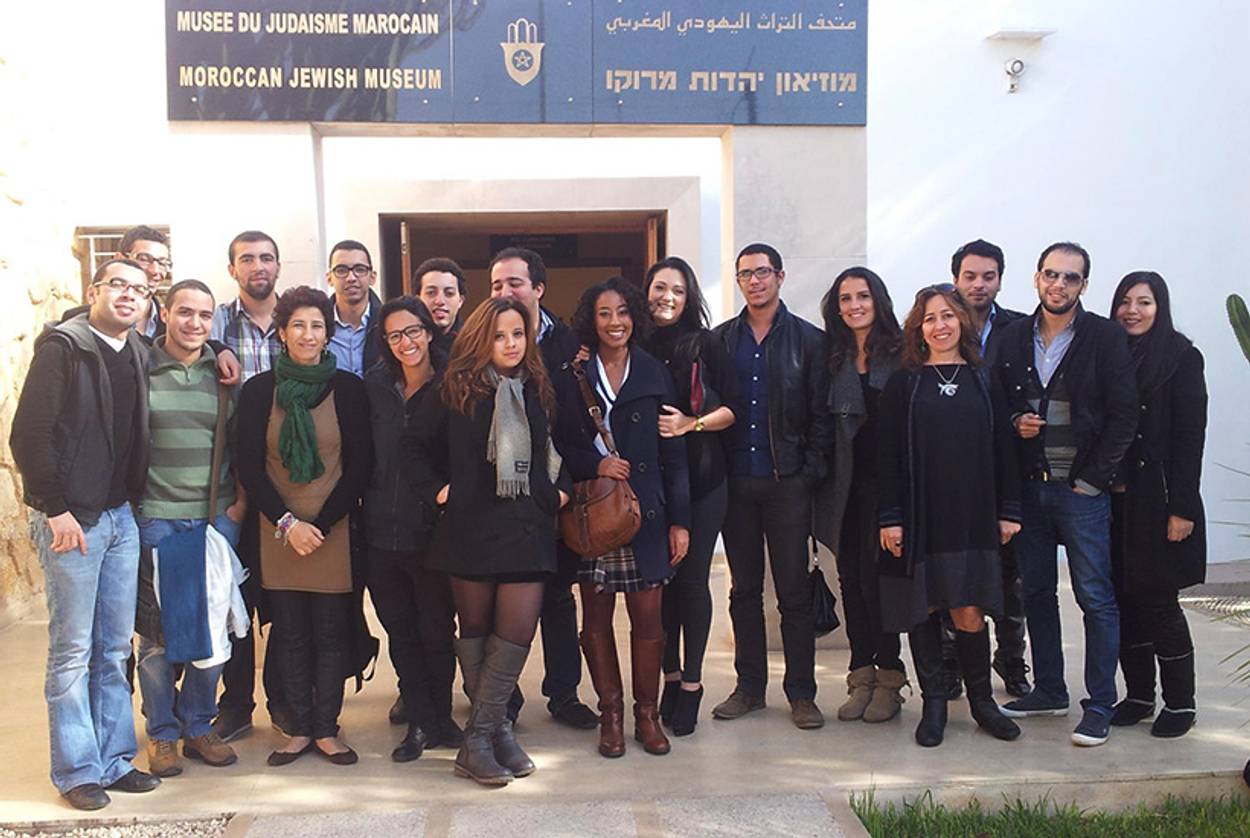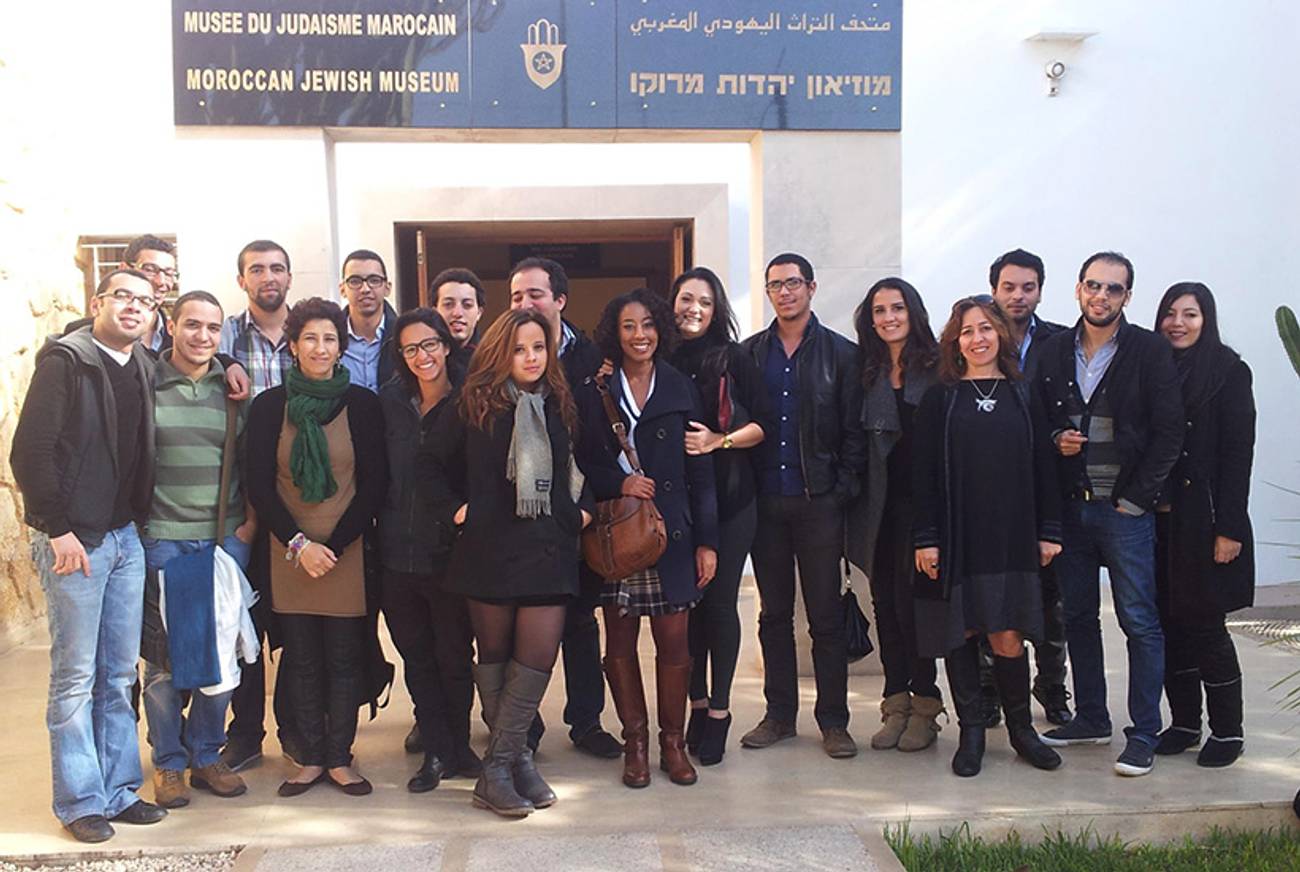For These Moroccan Muslims, Mimouna Isn’t Just a Jewish Thing—It’s Their Heritage, Too
Members of the Mimouna Club have made it their mission to learn about Jews and Jewish life as a way of learning about themselves




Ifrane is a small resort town tucked into Morocco’s Middle Atlas Mountains about two hours north of the capital, Rabat. It is known as the place where the late King Hassan II hosted Shimon Peres, then Israel’s prime minister, in 1986—a move that earned Hassan II condemnation from his Arab League allies and prompted Syria, under the leadership of Hafez al Assad, to break off relations altogether. Ifrane is also the place where, less than a decade later—in January 1995, to be exact—Yasser Arafat, the former head of the PLO, helped the king inaugurate the Al-Akhawayn University, on the heels of the fifteenth session of the Al-Quds Committee, which took place at the university’s new library.
It is a mere historical coincidence that Ifrane witnessed both events. But Hassan II envisioned Al-Akhawayn—where I happen to have graduated in 1997—as an institution devoted to introducing Moroccan students to diverse religious traditions, cultures, and civilizations through exposure to global humanities and social sciences. So, it is perhaps no coincidence that, in 2007, the university became home to Morocco’s first student club devoted to celebrating the country’s Jewish history and heritage.
The club is called Mimouna, after the traditional Moroccan Jewish post-Passover celebration welcoming the return of leavened bread. For Moroccan Jews, Mimouna signifies the promise of redemption and the hopeful return of the messiah. Israel recognized it as a national holiday in 1966; the Mimouna Club contends that the observance deserves a place in Moroccan culture and society, as a celebration of ethnic diversity. Today, it has foundation status and chapters in Fès, Rabat, Tetouan, and Marrakech.
In December, I met a few members of the foundation in Rabat, where they were preparing to launch a cultural caravan, a 300-mile traveling roadshow about Moroccan Judaism. I asked them why they care about a topic that could potentially bring them nothing but stigma and social rejection. Almost all of them highlighted how little Moroccan youth know about their history and how significant it is for their compatriots beyond the walls of university campuses to embrace Morocco’s cultural diversity.
***
For many Moroccans, particularly younger ones, the country’s Jewish story is part of the past and has no place in post-independence society. “How could we have a club about Moroccan Jews many of whom occupy Palestinian lands today?” one Mimouna critic in Casablanca whispered to me during a visit I made in 2010. It was an attitude I knew well from my anthropological and ethnographic research on Moroccan Jewish communities—but the social pressure on me as a professional ethnographer was minimal compared to the pressures the student members of Mimouna face. A few acknowledged their frustration and anxiety about being ostracized just because of their interest in learning about Moroccan Judaism—really, about Moroccan history. Recently, the name of one of the Mimouna club members was listed in a public document published online by the Moroccan Observatory Against Normalization with Israel, alongside names such as André Azoulay, an adviser to King Mohammed VI; Driss El-Yazami the president of the National Human Rights Council; and Berber, or Amazigh, activists, some of whom have contact with Israeli institutions, citizens, and other public organizations.
But when I spoke to these students in the course of completing work for a book on the monarchy, Jews, and Holocaust politics in Morocco, I was surprised to find that their interest in the history of Jewish-Muslim relations emerged from their own lives. The majority of them were born and raised in Casablanca, Rabat, Marrakech, and Fès and knew their hometowns had complex histories. Elmehdi Boudra, the co-founder of the club at Al-Akhawayn—who subsequently went on to earn a master’s degree in coexistence and conflict from Brandeis—talked to me about how he never knew, growing up in Casablanca, about the longstanding relations between Jews and Muslims in the old city. Boudra was also inspired by one of the group’s early mentors, Simon Lévy, a renowned linguist of Judeo-Arabic and Judeo-Spanish, a political dissident, and former director of the Jewish Museum of Casablanca who also played major role in Moroccan politics since Independence as one of the leading figures of the Party of Progress and Socialism founded by Ali Ya’ta. Another student, Sami Gaidi, described how he went to school in Rabat with Moroccan Jews with whom he remained in touch; a third, Myriam Mallouk, talked about how she was hosted by a Moroccan Jewish family while studying law in France.
In 1998, in a famous Le Monde Diplomatique article titled “Israel-Palestine: A Third Way,” Edward Said responded to Arab critics after his call for seeking communication with Jewish partners in an article that he published for al-Hayat newspaper in June 1998. Said called on Arabs to engage Jews in a responsible conversation including understanding the Holocaust. “When I mentioned the Holocaust in an article I wrote last November, I received more stupid vilification than I ever thought possible; one famous intellectual even accused me of trying to gain a certificate of good behaviour from the Zionist lobby,” Said wrote. “Of course, I support Garaudy’s right to say what he pleases and I oppose the wretched loi Gayssot under which he was prosecuted and condemned. But I also think that what he says is trivial and irresponsible, and when we endorse it, it allies us necessarily with Le Pen and all the retrograde right-wing fascist elements in French society.”
Mimouna has taken the challenge to heart. In 2011, the club attracted international attention after its members organized a conference on the record of Morocco’s King Mohammed V during World War II, when he resisted orders from the Vichy government to deport Jews living inside the kingdom. For the students, the point of organizing a conference on the Holocaust was to educate their fellow Moroccans about a period when refugees from Europe—many, though not all, Jewish—found shelter in Morocco before the Allies landed at Safi and Casablanca in late 1942. It was, one of them told me, a first step—“which is listening to the other and building a trustworthy relationship and a responsible discussion.” Speakers at the conference included a Holocaust survivor—a first for an Arab university. Within Morocco, Khalid Soufyani and other members of the anti-normalization movement argued that the conference undermined the Palestinians and their fight against Israeli occupation. Even Sion Assidon—a Moroccan Jew and former political dissident, critic of Zionism and Israel, and proponent of the BDS movement—harshly critiqued the club for what he saw as implicitly advocating normalization of relations with Israel.
A year after the Holocaust conference, 16 members of the club took a trip to Israel, where they had a firsthand experience of daily encounters between Jews and Muslims—and the realities of the conflict in Jerusalem, Tel Aviv, Haifa, and Ramallah and other places. They were also able to meet different generations of Moroccan Jews in Israel and the West Bank. The trip was organized in collaboration with Kivunim, a New York-based gap-year program created by Peter Geffen, the founder of the Heschel School on the Upper West Side. Geffen took the students to Jerusalem and Ramallah—and to Ashdod, where they visited a statue to Hassan II that stands in a city park. These young students reflected on the complexities of the conflict as their minds and emotions struggled to bridge the distance between Yad Vashem, Deir Yassin, the Haram al-Sharif, and the Western Wall. Despite the anxieties of the experience, they cherished meeting in person Israelis and American Jews as well as Palestinian Arabs, Christians, and Muslims. When I asked a student if he regretted making the trip after it attracted public criticism, he replied with confidence. “No, I do not regret the trip,” he told me. “I developed a strong friendship with Israelis and Palestinians who work together as we speak now for a possible, just, and peaceful world. It is tough. But the fact of seeing Israeli women standing between an Israeli soldier and a Palestinian worker gives me hope.”
These Mimouna youth are no longer alone in the Arab world. On the Jewish side, more American Jewish youth are also building alliances with groups like Mimouna Club, slowly changing the course of conversation about the Arab-Israeli conflict while learning more about the daily struggles, lives, and aspirations of Palestinian and Arab youth. And Palestinian students have also begun to engage in reciprocal actions. In fact, a group of Palestinian students recently made a visit to Auschwitz, led by Mohamed Dajani from al-Quds University. Many called for Dajani’s firing from the university, but Dajani is not new to these controversies. As founder of the Wasatia Mouvement, he has built academic relations with many in Israel and has advocated the teaching of the Holocaust and other cases of genocide in Palestinian schools, even as Palestinians fight for their rights with Israel and the recognition of the Nakba.
Mimouna Club is expanding its activities and networks with larger Moroccan, Arab, and Jewish communities in Europe, Middle East, and the United States. They plan to organize more historical conferences on WWII refugees in Tangiers and a second leg of the cultural caravan and to other Moroccan cities. For these young students, Mimouna is about celebrating difference and finding a cultural middle ground of communication and citizenship in Morocco.
***
Like this article? Sign up for our Daily Digest to get Tablet Magazine’s new content in your inbox each morning.
Aomar Boum is a cultural anthropologist and assistant professor in the School of Middle Eastern and North African Studies and Religious Studies Program at the University of Arizona, Tucson. He is also affiliated with the University of Arizona Center for Judaic Studies. He is the author of Memories of Absence: How Muslims Remember Jews in Morocco, and is currently working on two ethnographic and historical projects: The Monarchy, Jews and Holocaust Politics, 1930s-Present and Virtual Jews: An Ethnography of Moroccan Jews Online.
Aomar Boum is a cultural anthropologist and assistant professor in the School of Middle Eastern and North African Studies and Religious Studies Program at the University of Arizona, Tucson. He is also affiliated with the University of Arizona Center for Judaic Studies. He is the author of Memories of Absence: How Muslims Remember Jews in Morocco, and is currently working on two ethnographic and historical projects: The Monarchy, Jews and Holocaust Politics, 1930s-Present and Virtual Jews: An Ethnography of Moroccan Jews Online.